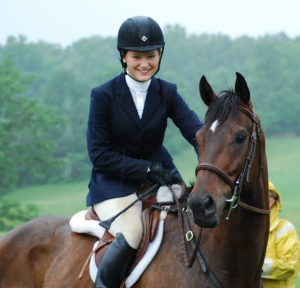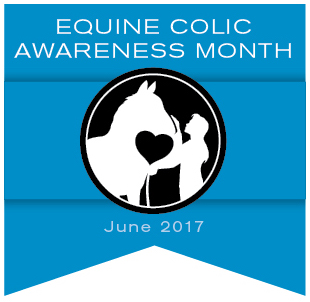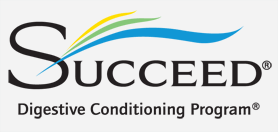The article was written by Rebecca Barber, our 2014 “spokes-horseperson” for Colic Awareness Month.
What does the theme of this year’s colic awareness month mean to me? “Learn. Live. Ride On.,” means that I strive to surround myself with the best.
In an industry filled with opinions and unknowns, finding accurate and reliable information is a top priority. This is one of the many reasons why I love being a working student. By spending approximately 12 hours a day in an upper level barn you experience everything. Surrounded by a team of riders, trainers, vets, farriers, chiropractors, etc., you learn first-hand how to manage these magnificent, yet delicate, athletes.
As a member of the “support crew” it is your job to inform the rider of any changes in their mount that could serve as a symptom of a potential ailment or lameness. As a working student you are responsible for knowing what is normal for each and every horse in your care. Does he like to stand in the front or back of the stall? Does she gobble down her feed or does she pick at it throughout the day? Is he one to lie down in his stall? Does he normally pace when there is activity in the barn? It takes a village to mange a performance horse, and as staff you work to both prevent and catch any abnormalities in the horses in your care.
It is important to recognize that in the horse world every rider, trainer, or program can do things slightly differently. Having worked at various barns I have come to the conclusion that there really is no “right” way to do things; it all depends on the particular horse and present situation. You need to know your horse, surround yourself with reputable professionals who you respect, and trust your own instinct.
Never be afraid to ask questions. All professionals were once in your shoes, first learning the ”tricks of the trade.” And while you might not realize it they are all still learning. Look in the stabling at any big completion and you will see the “big name riders” talking about their management practices, discussing how the course rode, and sharing stories of success and failures.
I have eight months (yay for getting ahead on college coursework!) to spend as a full time working student and I plan to make the most of them. As with any aspect of life, you get what you put into it. Work hard, go above and beyond, and ask lots and lots and lots and lots of questions. If you don’t ask, how are you going to know why your rider chooses one supplement over another, or the vet chooses one treatment route instead of alternative? Don’t leave as soon as your chores are complete. Stick around and watch as your boss schools other students or spend some time pampering and getting to better know your horse. Learn to enjoy the process. It’s not about the ribbons, the successes, or the accomplishments; it’s about the knowledge that’s gained and the partnership that is formed.
By making knowledgeable and informed decisions you, as owner, have the ability to maximize your horse’s health and prevent devastating ailments such as colic. As a result, the number of years you can spend in the saddle enjoying your best friend can be maximized.
 Meet Rebecca Barber
Meet Rebecca Barber
A self-proclaimed “barn rat,” Rebecca is a a developing young event rider. Recognized by her peers for her outstanding attention to detail, her work ethic and her perfectionist personality, Rebecca has always led by example. Having competed other horses through training level eventing, she is now focused on bringing her new young horse, an off the track thoroughbred she found at Penn National last winter, up the levels. Rebecca, a senior at the College of William and Mary, is currently taking a semester off from school to be a working student for Holly and Marilyn Payne, where she has been given the opportunity to focus on her goals in the saddle.






